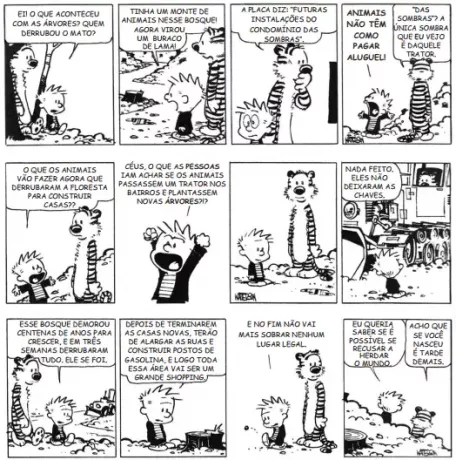Portuguese activity, suitable for students in the ninth year of elementary school, with questions aimed at the study of verbal phrases in the future. Students are oriented, above all, to identify these phrases and the ideas they express in the context of a reflective Calvin and Harold strip. Let's practice by answering the proposed questions?
This Portuguese language activity is available for download in an editable Word template, ready to print in PDF and also the completed activity.
Download this Portuguese exercise at:
SCHOOL: DATE:
PROF: CLASS:
NAME:
Read:

Question 1 - In the passage “What animals will do now […]”, the phrase in the highlighted future could be replaced by the verb:
a) do
b) did
c) would
d) will do
Question 2 - In the excerpt “Heavens, what would people think if animals […]”, the phrase in the future “would find” was inflected in the way:
a) indicative
b) subjunctive
c) affirmative imperative
d) negative imperative
Question 3 - The use of the phrase "would find" indicates something:
a) right
b) completed
c) hypothetical
d) predictable
Question 4 – “After the new houses are finished, they will have to widen the streets […]”. Identify the phrase in the future that makes up this part of the text:
A:
Question 5 - The phrase in the future, identified in the previous question, expresses:
a) a request
b) a hypothesis
c) a wish
d) an obligation
Question 6 – Rewrite the following sentences, replacing the phrases in the future with the equivalent verbs of meaning:
a) “[…] and soon this whole area will be a big mall.”
A:
b) "And in the end there won't be any nice places left."
A:
Question 7 – Check the alternative that contains the rewrite of the sentence "What happened to the trees?" in the past tense future:
a) "What will happen to the trees?"
b) "What would happen to the trees?"
c) "What will happen to the trees?"
d) "What happened to the trees?"
By Denyse Lage Fonseca – Graduated in Languages and specialist in distance education.
At answers are in the link above the header.
 report this ad
report this ad